[Note: Much of this interview originally appeared in Wagner News in July of 1985. Thirty
years later, it was slightly re-edited and the rest of the conversation was
added for this website presentation. The photos and links were also
added at that time.]
Helga
Dernesch — Secure in Her New Repertoire
By Bruce Duffie
Helga Dernesch is that rarest of rare singers who made a wonderful career
in the heavy and dramatic roles of Wagner, and then, as she told me, on the
"lucky advice of Christoph von Dohnanyi" reshaped both her voice and career
so that now she sings dramatic mezzo-soprano roles. Such a complete
change is not often attempted by an artist in mid-career, and when it does
happen, mostly it is from lower and smaller roles to higher and larger ones.
So Miss Dernesch's courageous (but very correct) step shows both her ability
to make decisions, and the desire to be the very best in the register most
suited to her.
Before shifting repertoire early in 1979, Dernesch had an international
career going, and was well-known for many roles —
among them the Marschallin in Der Rosenkavalier (both in German and
in English!), Leonora in Fidelio,
and, of course, the big Wagnerian roles including Brünnhilde and Isolde.
But she always has done a lot of roles — Waltraute
will be her sixth part in Götterdämmerung
alone! Her self-confessed favorites in the Ring are Sieglinde and the Götterdämmerung Brünnhilde.
Now she is moving into the lower register where she is more comfortable, and
roles like Klytemnestra, Herodias, and Fricka occupy her time these days.
Occasionally, she does concerts, as was the case in November of 1982, when
I had the chance to meet her between performances [and recording] of the Mahler
3rd Symphony with the Chicago Symphony
Orchestra under Sir Georg Solti. [See my Interviews with Sir Georg Solti.]
Her English was excellent, and she gave every indication of being quite content
with everything going on around her. A bit introspective, but with a
twinkle in her eye, Miss Dernesch chatted with me for about 45 minutes, and
here is what was said . . . .
Bruce Duffie:
When you're preparing these roles of Wagner, do the prose writings influence
your portrayals?
Helga Dernesch:
I saw my first Wagner opera when I was 12 years old and it's all so clear
for me personally. Of course, I read about them and always look around
for new impressions. I read all the new books that come out about Wagner,
but I'm quite clear on what I'm going to do.
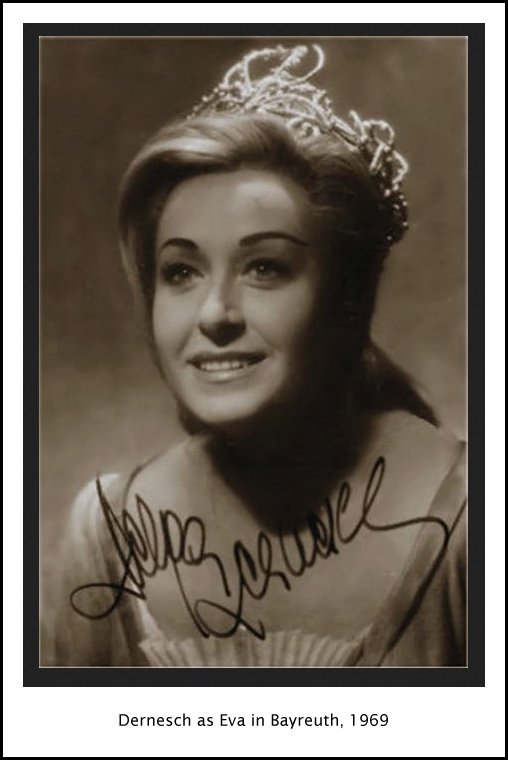 BD: Do any of the stage directors with whom you
work try to change your ideas?
BD: Do any of the stage directors with whom you
work try to change your ideas?
Dernesch: Yes.
Just last evening, I was talking with Maestro Solti about our unlucky experience
in Paris. It was supposed to be a full Ring, but it stopped after Walküre because it was so unlucky
all in all. We were both involved and we suffered quite a lot of disappointment.
Both of the producers are very famous for producing plays
— especially Peter Stein who does wonderful things in West Berlin.
I looked so very much forward to working with him, but it was very unfortunate
all the way around.
BD: Didn't you
even learn what not to do?
Dernesch: No,
I didn't learn anything from that. It was just gorgeous to have Solti
conducting, but he only conducted a few of the performances, and then he
left and we still had to go through many other performances without him.
But the music is so gorgeous and the parts are so gorgeous that you try to
go on.
BD: Just try
to blot out all that is going on and give a concert?
Dernesch: Well,
it ended like that.
BD: How much
can you as a singer blot out the extraneous things going on about you?
Dernesch: Well,
you get used to it.
BD: Do you use
a prompter?
Dernesch: Yes,
of course, but until now I've been quite lucky, and I'm quite secure in what
I'm doing. [Reaches over to touch
the table which was made of wood] Just recently I had a marvelous
experience in San Francisco. The man in the prompter's box has a television
monitor, and he gives cues and prompts, and he's marvelous. Karajan
specially asks for him in the Salzburg festivals. He's a fantastic
man and his name is Philip Eisenberg. He's absolutely reliable every
second. [For more about
Eisenberg, see the box (!) at the bottom of this webpage.]
BD: You've done
some productions where there's a scrim. Does it bother you at all?
Dernesch: No,
not at all. But I did find that when I have to wear a headpiece which
is tight around my skull, it affects me very much. I find it takes
away the vibration of the bones in the head which is very important.
I warm up before the performance and I feel good, then when I get the thing
on my head I feel as though I've lost my voice. Even when my ears are
not covered, I can't hear and I can't feel my voice. It's a completely
different feeling for me.
BD: How much
does the costume and makeup affect your personality onstage?
Dernesch: Very
much. I nearly always do my own makeup.
BD: Some people
feel that stage directors and designers go too far away from the intentions
of the composers.
Dernesch: Yes,
you are right, but I think we have to experiment —
up to a certain limit. But I like that. I prefer it to an ordinary
production.
BD: [With a gentle
nudge] Would you want Fricka entering in a chariot drawn by rams?
Dernesch: [Laughing]
Well, let's see how it works.
BD: You are now
singing mezzo roles — are you more comfortable
with them?
Dernesch: Yes,
much more. I've already studied 17 or 18 new parts, and not just for
pleasure. I'm performing them all. I'm lucky that way.
BD: Do you prefer
staged operas to concerts?
Dernesch: It's
easier and I enjoy it more. Here, for instance, I sit during the first
three movements of the symphony, and it's nice to listen and watch the maestro,
but you cannot move at all. It's easier to come onto a stage dressed
up and made up as a completely different person. Then you can act and
move about when you sing. You don't find characters very much in concert
— you just have to be yourself.
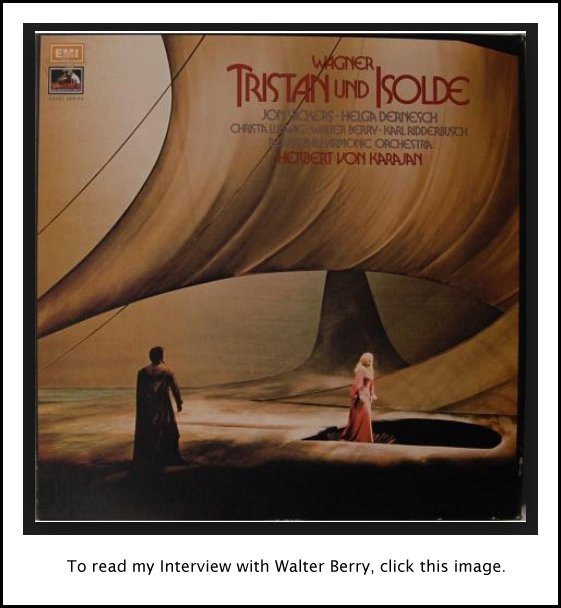 BD: Does opera work in concert form?
BD: Does opera work in concert form?
Dernesch: Why
not? I think it works. I did the third act of Götterdämmerung here when
I was still Brünnhilde! But it's much better to have sung the role
onstage before doing it in concert. It's the same with recording.
I prefer to do the recording of an opera I've sung onstage, but with Karajan
it was always the other way around.
BD: Did you ever
want to go back and re-record it later?
Dernesch: [Emphatically]
Yes! [Both laugh]
BD: Is it different
working with Karajan because he is both conductor and producer?
Dernesch: In
my experience, the best producers are the ones who come with their ideas
from the music, which leads us to Karajan.
BD: So his concept
is much more unified?
Dernesch: I wouldn't
say so. I've found a lot of producers who work just out of the music,
and that is always the right thing to do.
BD: Do you miss
the big, heavy parts now, or are you glad to be away from them?
Dernesch: I don't
miss them, no. I find it very beautiful to do Brangäne beside
an Isolde who appreciates how much I know of that part myself. A lot
of colleagues have told me that it's wonderful because I react to everything
because I know it so well.
BD: Let's stay
with that one for a moment — tell me about Brangäne.
What kind of woman is she, and how strong is she?
Dernesch: She
is very strong in her devotion and love to Isolde, and tries very hard to
do the best for her. That's why she gives them the wrong drink. In
that moment she thinks that it's best.
BD: Does she
understand the ramifications of what will happen because of it?
Dernesch: No,
I don't think so. She just wants to avoid the poison which would mean
instant death.
BD: Even though
that is what Isolde has demanded?
Dernesch: Yes.
* *
* * *
BD: Let's talk
about Brünnhilde a bit. Is the development from Walküre through Siegfried to Götterdämmerung a logical
one?
Dernesch: Yes.
With a man coming in her life, it's always a development.
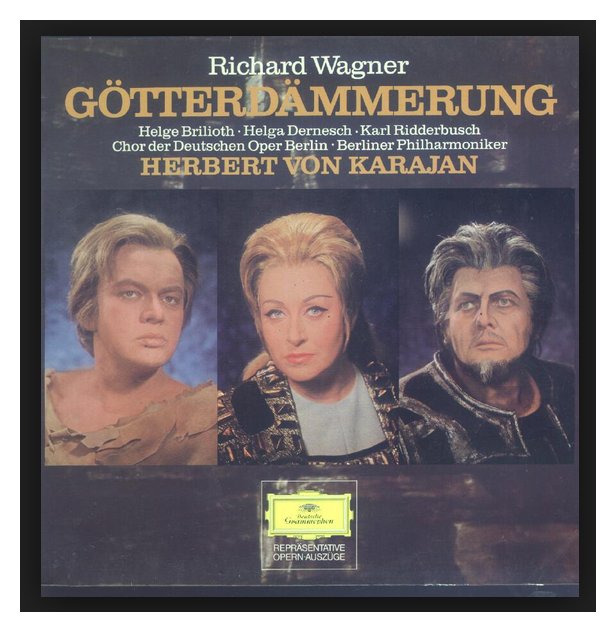 BD: Is the Prologue duet completely different from
the one which ends Siegfried?
BD: Is the Prologue duet completely different from
the one which ends Siegfried?
Dernesch: Yes,
it's after their first night and she has changed completely. She's
a woman now, not a Walküre.
BD: Is it a change
for the better?
Dernesch: Yes,
I would say so.
BD: If the Götterdämmerung Brünnhilde
is more womanly, is she trying to get her God-hood back in Act II?
Dernesch: No,
she's just playing as strong a woman as she can.
BD: Is the immolation
scene the culmination of just the opera, or of the Ring cycle, or is it truly something for
all mankind?
Dernesch: [Laughs]
Whooo, you have such beautiful questions! The immolation is very beautiful,
but I wouldn't go so far as to say it was a message for all mankind.
It's her feelings, and it's the end of an enormous piece of art. There
is much more in it than I ever thought of, but for her, it's the end.
BD: So it's an
ending, and not a "dawning of a new era" as Wagner's stage directions say?
Dernesch: It's
an ending, yes.
BD: Tell me about
Waltraute.
Dernesch: She
just tries to help. I think she feels that Brünnhilde is on the
wrong path.
BD: Should Brünnhilde
have given the ring back to the Rheinmaidens?
Dernesch: No,
I don't think so. She got it from her husband and she never would give
it up.
BD: She would
rather destroy the whole world?
Dernesch: Yes.
BD: Continuing
with the other parts in that opera, is there any malice in Gutrune?
Dernesch: No,
but her surroundings are so incredible and she is forced into all that she
does. She cannot be all good with Gunther and Hagen around. She
is so influenced by them.
BD: Could she
and Siegfried have been happy if there had been no Brünnhilde in the
picture?
Dernesch: I think
so.
BD: He wouldn't
have been too strong for her?
Dernesch: I believe
she's a very strong woman. As I said, it's her surroundings which are
terrible, and she's influenced by it all.
BD: In a Ring cycle, is it right for the same singer
to do both Fricka and Waltraute?
Dernesch: Yes.
BD: There's no
breaking up of continuity because it is the same artist?
Dernesch: I don't
think so. I also do the second Norn to warm me up!
But it's always done like that. Fricka also usually sings one of the
Walküres in Act III.
BD: But that's
different since she's just one of the crowd.
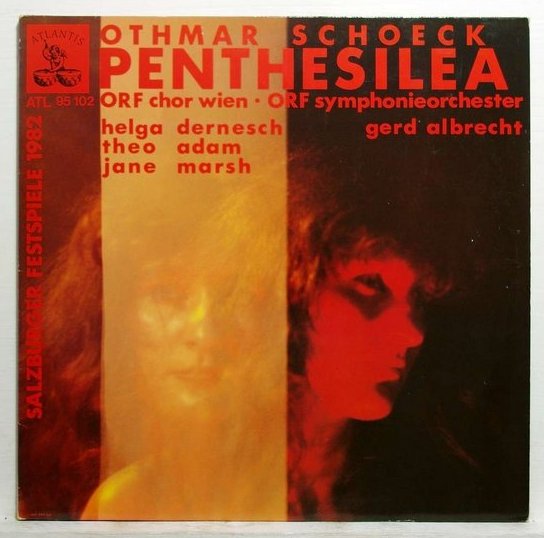 Dernesch: Yes, more anonymous, but it is an interesting
question. But it never occurred to me not to. I always did Sieglinde
and Gutrune. Because of some schedule shuffling, I'll be doing Erda
in Siegfried in San Francisco, which
I'm looking forward to.
Dernesch: Yes, more anonymous, but it is an interesting
question. But it never occurred to me not to. I always did Sieglinde
and Gutrune. Because of some schedule shuffling, I'll be doing Erda
in Siegfried in San Francisco, which
I'm looking forward to.
BD: You have
the low G?
Dernesch: Yes.
Do you know the opera Penthesilea?
BD: By Othmar
Schoeck?
Dernesch: Yes,
that's the one. We just did it in Austria, a recording and a concert
performance. You asked me about the low G, but my part in the Schoeck
opera needs F#, which is a half-step lower! It's an enormous part.
The opera is about one hour and 40 minutes without a break, and my character
is on for about one hour and 20!
BD: Doing Erda
in Siegfried, how would you decide
which role to sing in Rheingold
— Fricka or Erda?
Dernesch: Well,
of course I'm more interested in Fricka.
BD: Would you
do both on a recording?
Dernesch: I don't
image anyone would ask me to do it, but I don't think it would be a good
idea to do it.
BD: Does Fricka
know she is going to win the argument with Wotan before she starts?
Dernesch: Yes,
I'm sure.
BD: Is there
anything she would not do to win that one?
Dernesch: [Laughing]
I think we can say no. I think she would do everything.
BD: Is Fricka
in love with Wotan?
Dernesch: [Hesitates]
Ja . . .
BD: Even though
he philanders a lot, there's a genuine love-bond?
Dernesch: Yes.
They're real to life.
BD: Are these characters
human or are they Gods?
Dernesch: For
me they are very human.
BD: Even Brünnhilde
in Walküre?
Dernesch: Yes,
even in Walküre. How
else would she ever change her mind about Siegmund?
BD: Then how
do we differentiate between the Gods and the Wälsungs?
Dernesch: There
is not such a big difference. What is more human than the big narration
of Wotan?
BD: He's reminiscing
and thinking all at the same time.
Dernesch: That's
right.
BD: Does Brüunnhilde
help to shape his thinking at all?
BD: No, she just
agrees a little bit but doesn't shape it at all. She's really a child
in that scene.
BD: One more
of your roles in the Ring
— Sieglinde.
Dernesch: I did
that one hundreds of times. It's a gorgeous part. It is
the best part in Walküre
I would say.
BD: The best
part in the Ring?
Dernesch: No,
the best in the Ring is Brünnhilde
in Götterdämmerung.
I can't speak of the men's roles, but of the female roles, even though the
Fricka scene in Walküre is just
gorgeous, all in all I would say that Sieglinde and the last Brünnhilde
are just fantastic.
* *
* * *
BD: Let's move
away from the Ring and talk about
other Wagner. You're done Elisabeth in Tannhäuser [shown at right], but have you done Venus?
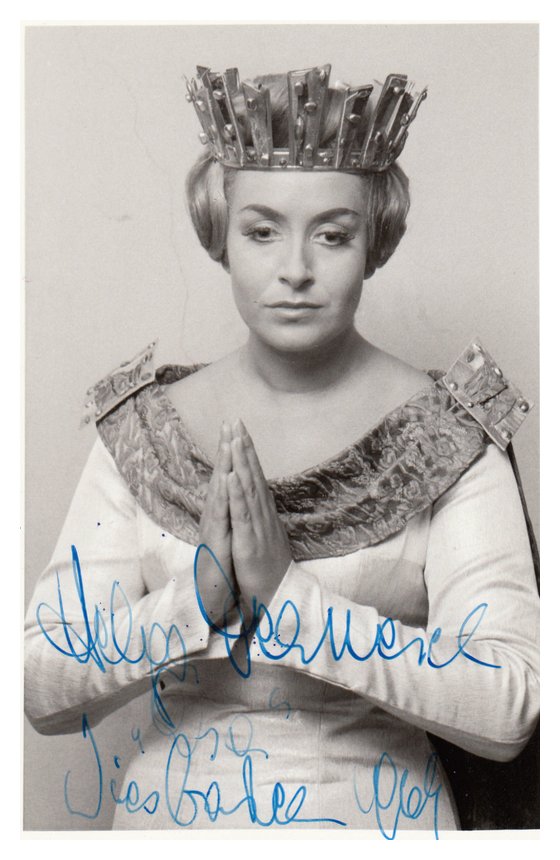 Dernesch: No. It's too high. I also
studied (and had contracts for) Ortrud, but I decided not to do it.
I'm very sorry about that, but it's just not the right part for me.
It would be ideal from the standpoint of personality and acting, and I would
love to do it — and of course I could do it
— but it's not a part I can do always, and when do you feel in
perfect form at the time of a performance? Then the trouble starts,
so I decided not to do it. The same just happened recently with Kundry.
I had a contract to do it with Ponnelle and Pritchard, but I decided again
not to do it. [See my Interviews with Sir John
Pritchard, the second of which centered on the works of Wagner.]
Dernesch: No. It's too high. I also
studied (and had contracts for) Ortrud, but I decided not to do it.
I'm very sorry about that, but it's just not the right part for me.
It would be ideal from the standpoint of personality and acting, and I would
love to do it — and of course I could do it
— but it's not a part I can do always, and when do you feel in
perfect form at the time of a performance? Then the trouble starts,
so I decided not to do it. The same just happened recently with Kundry.
I had a contract to do it with Ponnelle and Pritchard, but I decided again
not to do it. [See my Interviews with Sir John
Pritchard, the second of which centered on the works of Wagner.]
BD: [Wistfully]
I guess I miss all these things you say you will never do...
Dernesch: I would
love to, but it's not the right thing.
BD: If you did
sing both Venus and Elisabeth, would you do them in a single evening?
Dernesch: I don't
think so. It's a very good show for the soprano who can do it, and
I admire it.
BD: Is it more
than just a gimmick?
Dernesch: For
me, no. It's just a very good show, but when I have heard it done that
way, I always felt that neither one nor the other was perfect
— as it could have been if the lady had done only one part.
They are different.
BD: So it's not
really two sides of the same woman?
Dernesch: I don't
really see it like that. Did Wagner ever in his time have one lady
sing both?
BD: Not that
I know of.
Dernesch: We
would find some note from him if he had thought of it.
BD: When you
do these long roles . . .
Dernesch: [Interrupting]
I don't do long roles any more! My longest now
is the Nurse in Die Frau ohne Schatten.
BD: When you
did, how did you handle the intermissions? Did you need to re-vocalize,
especially when the time is long?
Dernesch: I'm
always vocalizing. I'm great at it! I've sung the role of the
Marschallin hundreds of times, and between and end of Act I and my entrance
in Act III is always more than two hours.
BD: What do you
do during that time?
Dernesch: Crosswords.
[Both laugh] It's impossible for me to concentrate on reading during
a performance. I cannot read a book because it brings me too far away
from the business at hand.
BD: Do you listen
to the performance on the monitor in your dressing room?
Dernesch: Yes,
always, but not too closely. I know it too well.
BD: Are there
any parts that you do too often?
Dernesch: No.
They can never be done too often.
BD: There is
always something new to learn?
Dernesch: Yes.
There is always a new production or a new maestro. I have done the Nurse
in several different opera houses including Vienna,
Munich, Hamburg, and with the Hamburg Opera in Moscow at the Bolshoi theater,
which is gorgeous. It was the first time that Russian audiences had
heard a live performance of Frau ohne Schatten,
and they loved it.
* *
* * *
BD: In this new
phase of your career, you seem to play an awful lot of nasty characters.
Do you like doing them?
Dernesch: My
new American agent has come to my dressing room many times when I'm heavily
made up as the Nurse, or Herodias, or the Witch in
Russalka, or Klytemnestra, and here
in Chicago he came backstage after the Mahler concert and said it was the
first time he's seen me normal! [Both laugh] But yes, I do enjoy
very much doing these parts. I've always been very interested in acting.
I go to many plays and I admire very much the actors, and I try to be one
of the operatic stage.
BD: How much
do you become the character and separate it from Helga Dernesch?
Dernesch: Completely.
BD: Does opera
work in translation?
Dernesch: Yes,
it does. And when it helps the public it is all right. A few
days ago I spoke with Scottish Opera in Glasgow and Edinburgh where I appeared
quite a lot. The company started in '62, and they did Così fan tutte in English.
Then two or three years later they brought it back in Italian. So the
interested public knows what it's about and understands the jokes, and now
they come back to the original language, which is a good idea. I did
the Rosenkavalier there in English.
BD: Did you enjoy
learning that huge part again in English?
Dernesch: [Matter
of factly] No. [Both laugh] And I did (Cassandra in) Les Troyens in English and later on in
French. I'm used to that, too.
BD: Will you
be doing Octavian now?
Dernesch: No,
I'm too old for that.
BD: Are there
other parts you are being asked to do that you simply say no?
Dernesch: Not
really, no.
BD: Do you enjoy
making records?
Dernesch: Yes.
I love it.
BD: You don't
find it too sterile, too cut-and-piece?
Dernesch: No.
That helps enormously. Why shouldn't we?
BD: Are records,
then, too perfect?
Dernesch: No.
It's always sung by human beings. When you listen carefully, you find
little mistakes in every one.
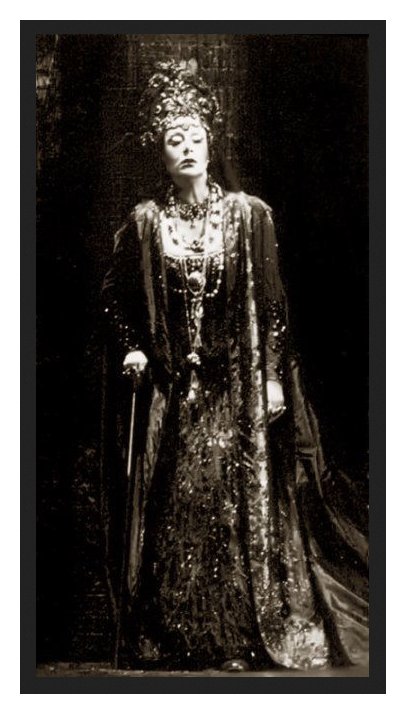 BD: Coming back to Richard Strauss, how evil is
Klytemnestra [photos at left and right]?
BD: Coming back to Richard Strauss, how evil is
Klytemnestra [photos at left and right]?
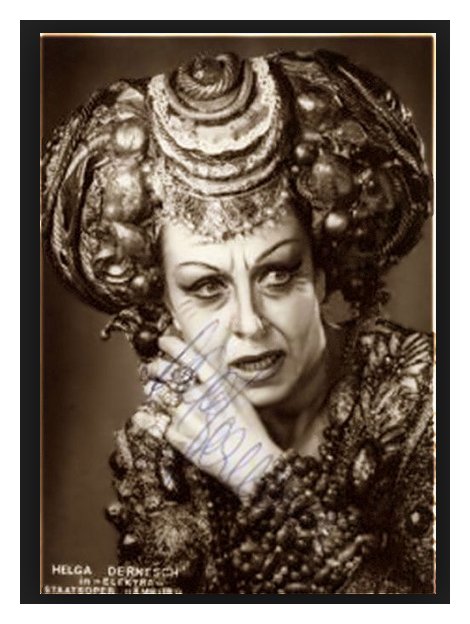 Dernesch: She's a very disappointed woman. She
heard that her husband had other women during the war, so she decided to
have another man. That's the story.
Dernesch: She's a very disappointed woman. She
heard that her husband had other women during the war, so she decided to
have another man. That's the story.
BD: [Gently protesting]
But she didn't have to go so far as to knock him off!
Dernesch: [Smiling]
Well... She's a very proud and very beautiful woman who is not old.
I must be very careful because I'm one of the younger singers who sings her.
Normally it's sung by elderly ladies. It's the same as Herodias, but
she is evil! But Klytemnestra, being the sister of Helena cannot be
old. She cannot have had her children at forty! Elektra is about
25 or 26, so that makes Klytemnestra about 45.
BD: So if a stage
director tried to make her an old hag...
Dernesch: [Interrupting]
No, I won't do that! She's very ill from all her 'bad nights' as she
says, which you can show in her behavior and her movements. But she
mustn't be ugly.
BD: So she's
a wreck rather than ugly?
Dernesch: Yes.
She is also nervous.
BD: Is she paranoid?
Dernesch: I think
so, a little bit. It's all in the music, so you can bring it all out.
BD: Has this
all rubbed off on Elektra?
Dernesch: She's
been brought up in the environment, but I don't think they spent a lot of
time together.
BD: Is there
any love between those two?
Dernesch: No.
Maybe when she was a child, but Agamemnon was away for ten years.
BD: Did you ever
sing Elektra?
Dernesch: No,
never. I did Chrysothemis.
BD: She always
seems to be the bearer of old news!
Dernesch: [Amused]
Yes.
BD: Is Chrysothemis
simple-minded?
Dernesch: No,
she is innocent. She says she just wants to marry and have children.
That's her whole idea of life. She is quite normal.
BD: How could
she grow up and be normal in that strange atmosphere?
Dernesch: She
has a healthy psyche! [Both laugh]
BD: Now you say
Herodias is evil?
Dernesch: Yes...
BD: As evil,
say, as Hagen?
Dernesch: She
did all a woman can do. Herod and Herodias must have killed a lot of
people together. That's the only thing that keeps them together
— all their secrets and the fear of what they have done
together. There is no love between them. There is sex but no
love. That is how I see it.
BD: Is that why
she goads Salome on to demand the head of Jochanaan?
Dernesch: Yes,
she hates Jochanaan because all the time he is down there in the cistern,
he is talking bad about her. She wants rid of him.
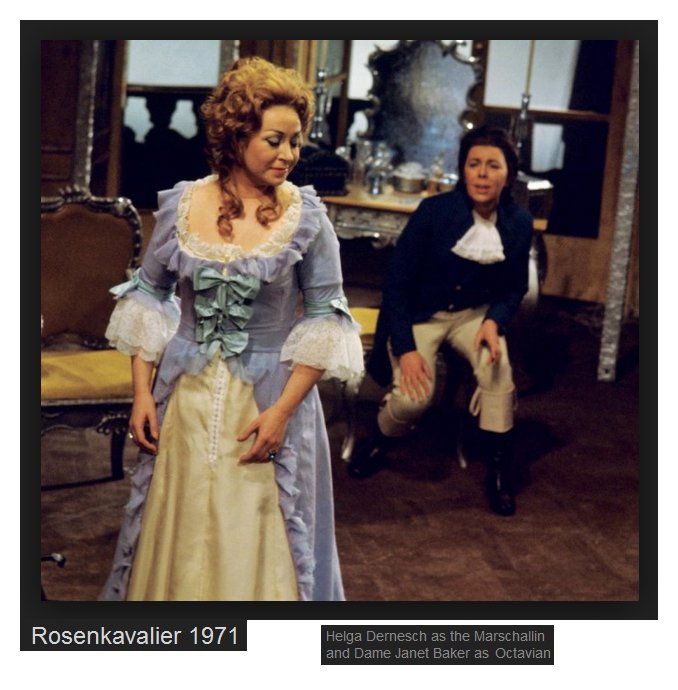 BD: Let's turn to the other side and speak of the
Marschallin. Did you like playing her?
BD: Let's turn to the other side and speak of the
Marschallin. Did you like playing her?
Dernesch: I did
like it, yes. I did my first performances of her when I was 27 or 28.
BD: Was that
too young to do her?
Dernesch: No,
it was not too young, but the feeling is quite different from what it would
be now.
BD: How old is
the Marschallin?
Dernesch: Around
35.
BD: Is she happy
with the Field Marshall at all?
Dernesch: No...
She came out of the convent and was married just like that.
BD: Wouldn't
she have tried to fall in love with him?
Dernesch: I don't
know. Perhaps there is a kind of relationship I'm sure, but she doesn't
love him.
BD: Does she
love Octavian?
Dernesch: [Amused]
Yes, well... I don't think she really loves him. What she loves is the
feeling she gives her, to be attractive and to be loved. It's very dangerous
in our lives to think you love somebody, but you just love what he is doing
to you and giving you. [Laughs] It makes you feel good and comfortable
and young and beautiful and all that.
BD: Is Octavian
either the first or the last for the Marschallin?
Dernesch: No.
Never the last and certainly not the first.
BD: Do you think
Sophie and Octavian are happy in the "fourth act"?
Dernesch: Yes,
I think so, but not for a long time. [Turning the tables to ask a question]
Do you think they marry?
BD: They go off
together, and one would assume Octavian would do the honorable thing.
But I'm just wondering if he would be satisfied with her?
Dernesch: I don't
think so.
BD: Does the
Marschallin see a lot of herself in Sophie?
Dernesch: Coming
from the convent and being married, but I think the Marschallin is much more
clever. Sophie is very nice, but she's a little naïve.
* *
* * *
BD: Do you sing
any early music - Monteverdi or Cavalli?
Dernesch: No.
I don't know why.
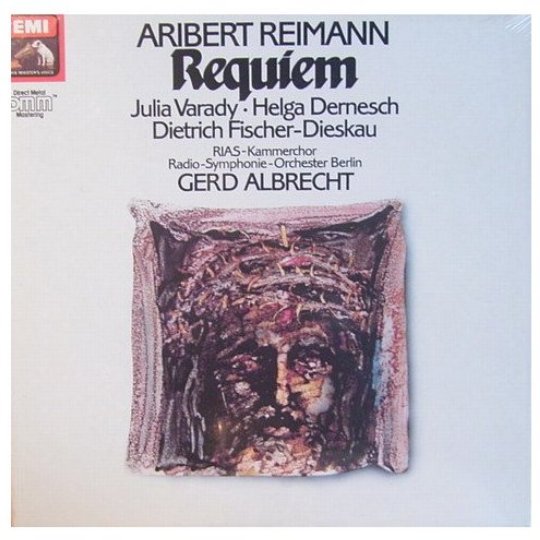 BD: Does the music of that time speak to us today?
BD: Does the music of that time speak to us today?
Dernesch: Yes.
I Europe they do a lot of recordings and productions. Oh yes, it's gorgeous,
which leads us to contemporary music! [Both laugh]
BD: Do you like
the direction music is going today?
Dernesch: Yes,
and I'm very lucky. You probably heard about our production of Lear by Reimann in Munich and San Francisco
[recording and program shown in box below].
It was such an enormous success that we're going to have it again. I
had to re-study the whole part in English. We just had the world premiere
of his Requiem which he wrote for
Fischer-Dieskau, Julia Varady and myself, and we will perform it in Berlin
in January and we will record it. It's an enormous piece and it's incredible.
It was very successful.
BD: It's quite
different from, say, Lulu.
Dernesch: Do
you consider Lulu to be contemporary
music? I grew up in Vienna with Lulu
and Wozzeck.
BD: Will you
sing Countess Geschwitz?
Dernesch: I would
love to. It's a gorgeous part.
BD: What are
some of the other new parts coming up for you?
Dernesch: I will
do Marfa in Khovanshchina in Russian!
I will learn it phonetically. Many years ago, when I was a contract
singer in Cologne — that must have
been in 1966 — I sang the very little
part in the beginning, the screaming girl which takes about five minutes.
Back then I wasn't so interested in it, so I never saw the whole opera.
It's a shame, I know, but I didn't even look at a rehearsal. I just
did my part and went off. Horrible isn't it? Marfa is finished
after Act II, but now, of course, I will stay until the end of the premiere
because everyone has to take the curtain call when it is over. But I'm
not sure I will stay until the end each night for the entire series.
But now I know what is going on in Act III.
BD: You mention
doing a scream. How do you prepare for the scream of Klytemnestra?
Dernesch: I never
scream myself. You're not going to risk ruining your voice by doing
a scream. I can do it, but when I did my first performance in Berlin,
I was so used to doing it everywhere — in
Munich and Vienna — I never had to
scream and nobody argued about it. There was always somebody there
to do the scream, and then it suddenly occurred to me that there was no one
there to do it. So I went to the co-producer and asked about it and
he said, "No. Our Klytamnestras always scream themselves." So
I had to do it and it went very well.
BD: Thank you
so very much for spending this time with me today.
Dernesch: It
was a pleasure.
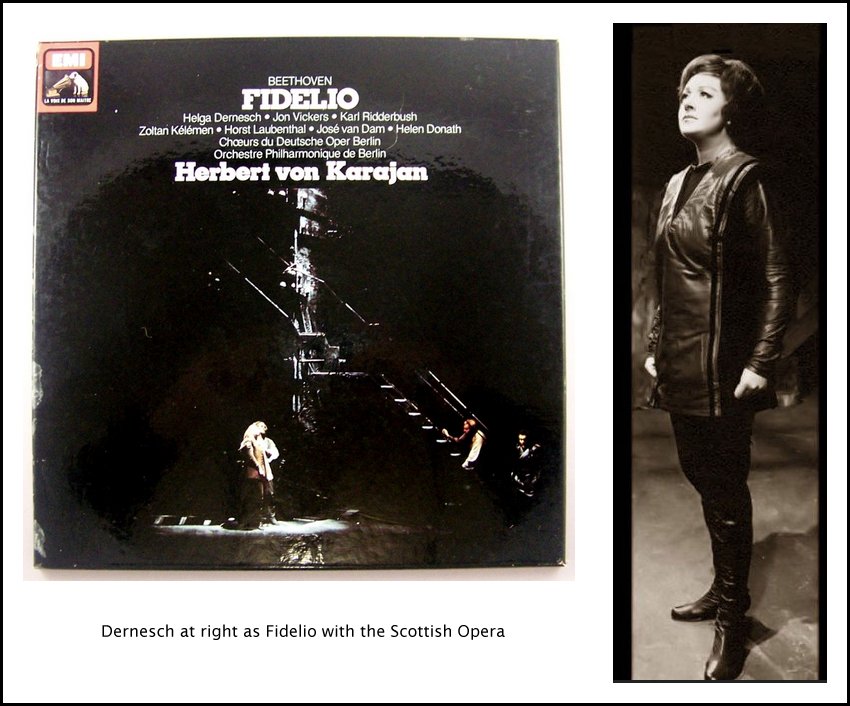 To read my Interview with Jon Vickers, click HERE.
To read my Interview with Jon Vickers, click HERE.
To read my Interview with José van Dam, click HERE.
To read my Interview with Helen Donath, click HERE.

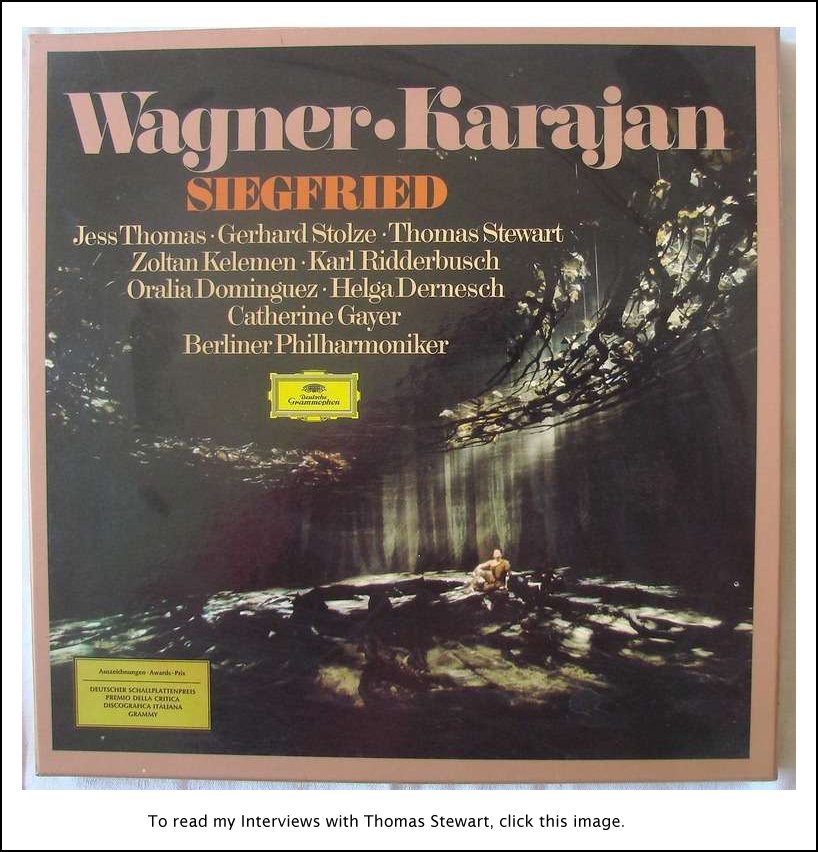

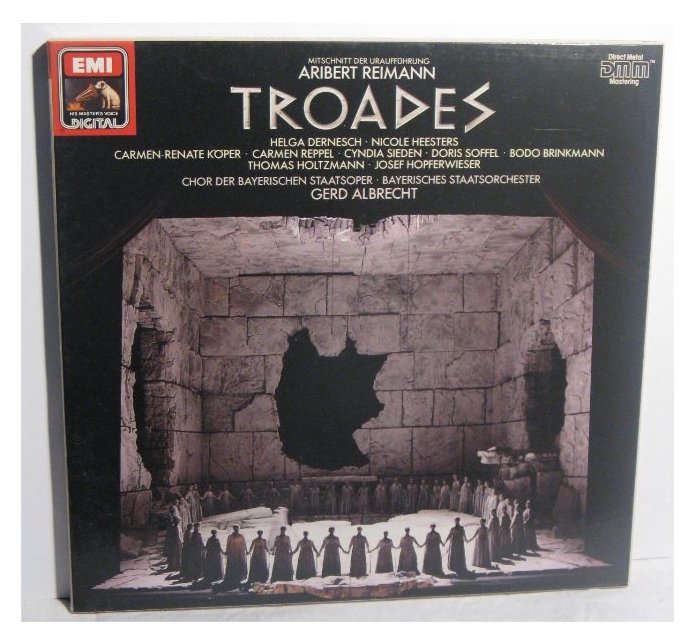
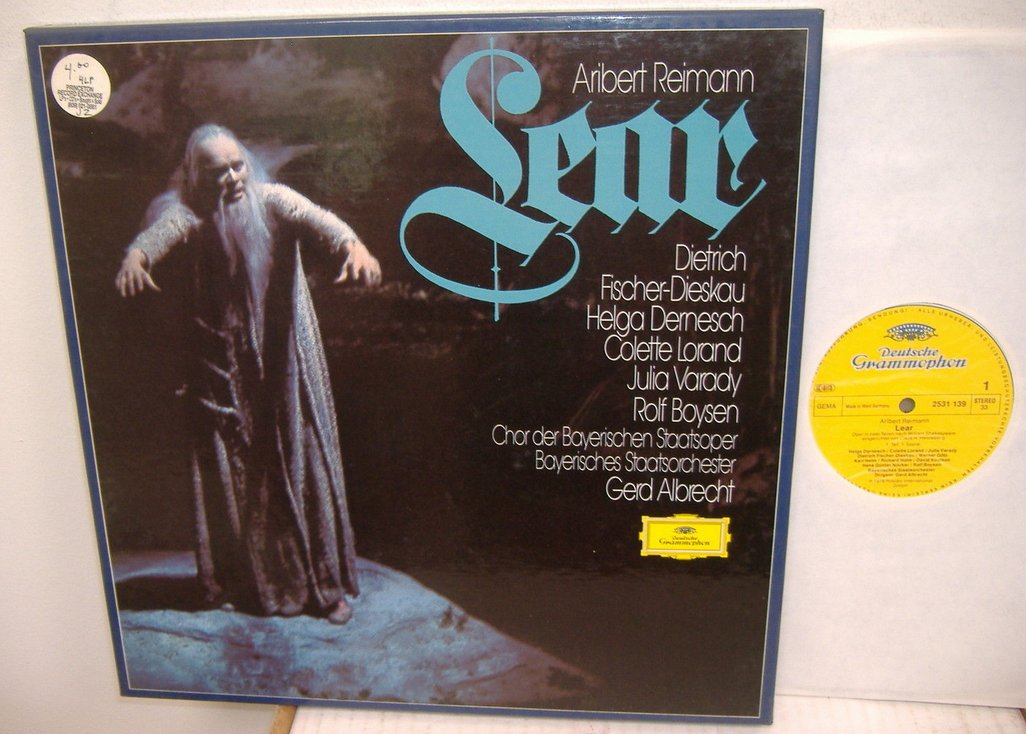
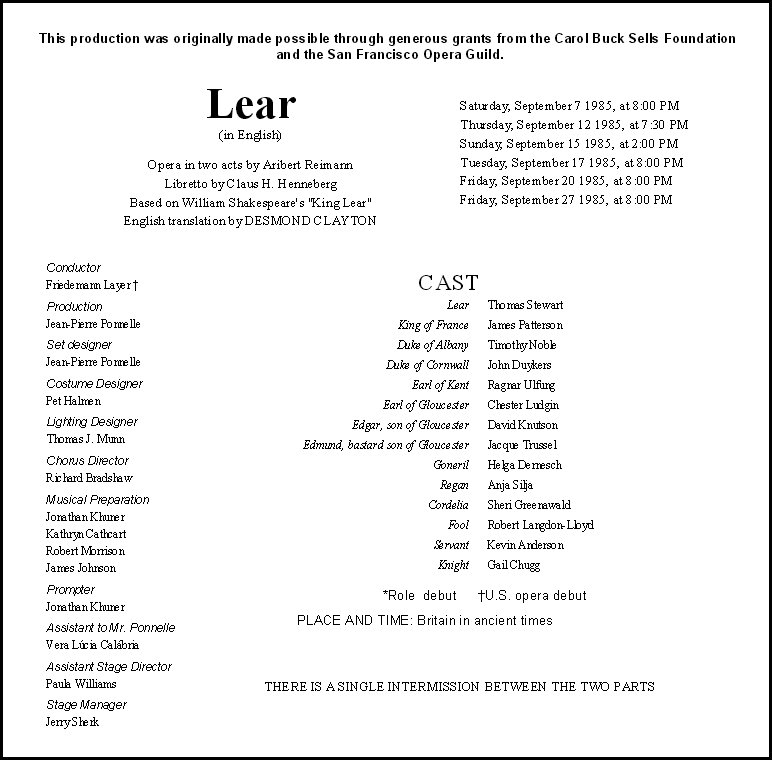 To read my Interview with Aribert Reimann, click HERE.
To read my Interview with Aribert Reimann, click HERE.
To read my Interview with Ragnar Ulfung, click HERE.
To read my Interview with Jacque Trussel, click HERE.
To read my Interview with Anja Silja, click HERE.
To read my Intervieew with Sheri Greenawald, click HERE.

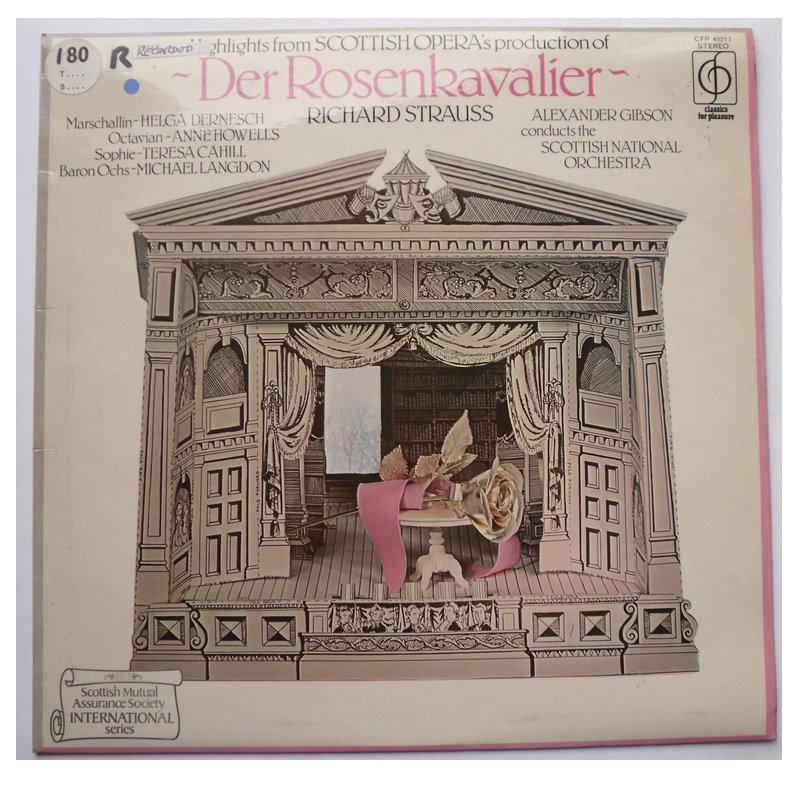 To read my Interview with Anne Howells, click HERE.
To read my Interview with Anne Howells, click HERE.
To read my Interview with Michael Langdon, click HERE.

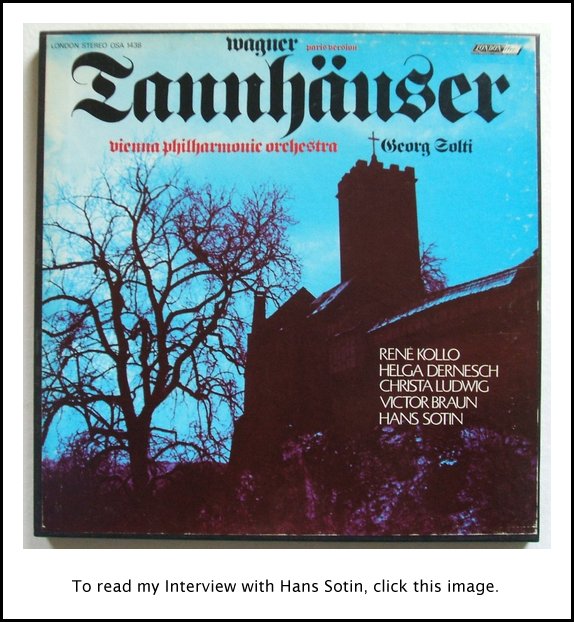

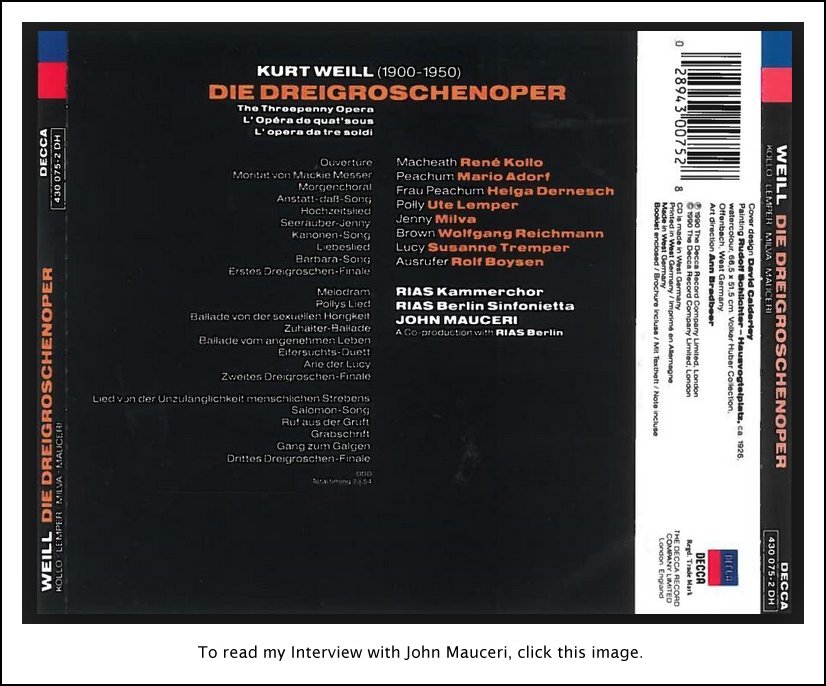
|
=========
========= =========
========= =========
-- -- -- -- -- -- -- --
-- -- --
========= =========
========= =========
=========
Bruce Duffie will soon complete a decade of service with WNIB, Classical
97 in Chicago. In addition to his on-air work, he selects and annotates
the regular Sunday Evening Opera. His interviews with leading singers,
conductors, directors, and composers have appeared on WNIB, as well as in
OPERA SCENE (of which he was the editor), the Massenet Newsletter, which is
published by the American Branch of the Massenet Society, Nit & Wit Magazine,
as well as many previous issues of WAGNER NEWS. Several of his interviews
have also been placed in the Archive of Contemporary Music at Northwestern
University.
=========
========= =========
========= =========
-- -- -- -- -- -- -- --
-- -- --
========= =========
========= =========
=========
© 1982 Bruce Duffie
This conversation was recorded at her hotel in Chicago on November
6, 1982. The transcription of the Wagner sections was made and published
in Wagner News in July of 1985.
Portions were broadcast (along with recordings) on WNIB in 1989, 1992, 1994,
1998, and 1999. The transcription was slightly re-edited and completed
in 2015, photos and links were added, and it was posted on this website at
that time.
To see a full list (with links) of interviews which have been transcribed
and posted on this website, click here. To
read my thoughts on editing these
interviews for print, as well as a few other
interesting observations, click here.
* * * *
*
Award -
winning broadcaster Bruce Duffie
was with WNIB,
Classical 97 in
Chicago from 1975 until its final moment
as a classical station in February
of 2001. His interviews have also appeared
in various magazines and journals since
1980, and he now continues his broadcast series
on WNUR-FM,
as well as on Contemporary
Classical Internet Radio.
You are invited
to visit his website for more
information about his work,
including selected transcripts
of other interviews, plus a full list of
his guests. He would also like to call
your attention to the photos and information
about his
grandfather, who was a pioneer in the automotive
field more than a century ago.
You may also send him E-Mail with comments,
questions and suggestions.
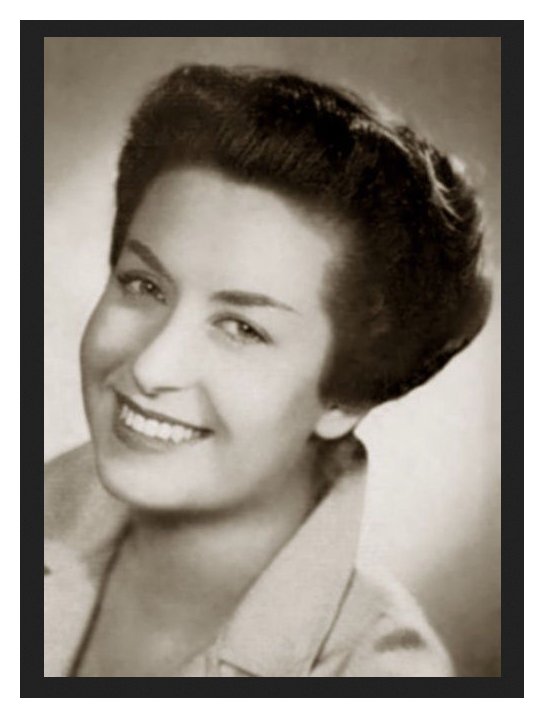

 BD: Do any of the stage directors with whom you
work try to change your ideas?
BD: Do any of the stage directors with whom you
work try to change your ideas? BD: Does opera work in concert form?
BD: Does opera work in concert form? BD: Is the Prologue duet completely different from
the one which ends Siegfried?
BD: Is the Prologue duet completely different from
the one which ends Siegfried? Dernesch: Yes, more anonymous, but it is an interesting
question. But it never occurred to me not to. I always did Sieglinde
and Gutrune. Because of some schedule shuffling, I'll be doing Erda
in Siegfried in San Francisco, which
I'm looking forward to.
Dernesch: Yes, more anonymous, but it is an interesting
question. But it never occurred to me not to. I always did Sieglinde
and Gutrune. Because of some schedule shuffling, I'll be doing Erda
in Siegfried in San Francisco, which
I'm looking forward to. Dernesch: No. It's too high. I also
studied (and had contracts for) Ortrud, but I decided not to do it.
I'm very sorry about that, but it's just not the right part for me.
It would be ideal from the standpoint of personality and acting, and I would
love to do it — and of course I could do it
— but it's not a part I can do always, and when do you feel in
perfect form at the time of a performance? Then the trouble starts,
so I decided not to do it. The same just happened recently with Kundry.
I had a contract to do it with Ponnelle and Pritchard, but I decided again
not to do it. [See my Interviews with Sir John
Pritchard, the second of which centered on the works of Wagner.]
Dernesch: No. It's too high. I also
studied (and had contracts for) Ortrud, but I decided not to do it.
I'm very sorry about that, but it's just not the right part for me.
It would be ideal from the standpoint of personality and acting, and I would
love to do it — and of course I could do it
— but it's not a part I can do always, and when do you feel in
perfect form at the time of a performance? Then the trouble starts,
so I decided not to do it. The same just happened recently with Kundry.
I had a contract to do it with Ponnelle and Pritchard, but I decided again
not to do it. [See my Interviews with Sir John
Pritchard, the second of which centered on the works of Wagner.]
 BD: Coming back to Richard Strauss, how evil is
Klytemnestra [photos at left and right]?
BD: Coming back to Richard Strauss, how evil is
Klytemnestra [photos at left and right]? Dernesch: She's a very disappointed woman. She
heard that her husband had other women during the war, so she decided to
have another man. That's the story.
Dernesch: She's a very disappointed woman. She
heard that her husband had other women during the war, so she decided to
have another man. That's the story. BD: Let's turn to the other side and speak of the
Marschallin. Did you like playing her?
BD: Let's turn to the other side and speak of the
Marschallin. Did you like playing her? BD: Does the music of that time speak to us today?
BD: Does the music of that time speak to us today?











